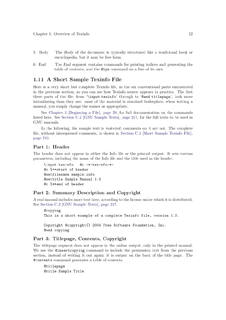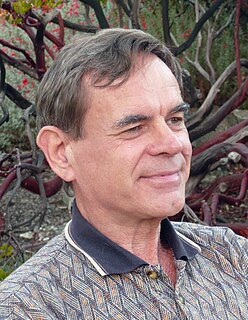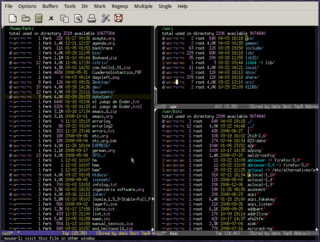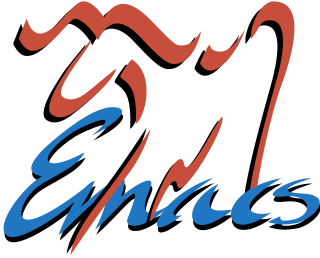Related Research Articles
The editor war is the rivalry between users of the Emacs and vi text editors. The rivalry has become a lasting part of hacker culture and the free software community.

GNU is an extensive collection of free software, which can be used as an operating system or can be used in parts with other operating systems. The use of the completed GNU tools led to the family of operating systems popularly known as Linux. Most of GNU is licensed under the GNU Project's own General Public License (GPL).
The hacker ethic is a philosophy and set of moral values that is common within hacker culture. Practitioners of the hacker ethic believe that sharing information and data with others is an ethical imperative. The hacker ethic is related to the concept of freedom of information, as well as the political theories of anti-authoritarianism, socialism, liberalism, anarchism, and libertarianism.
TECO, short for Text Editor & Corrector, is both a character-oriented text editor and a programming language, that was developed in 1962 for use on Digital Equipment Corporation computers, and has since become available on PCs and Unix. Dan Murphy developed TECO while a student at the Massachusetts Institute of Technology (MIT).
A recursive acronym is an acronym that refers to itself. The term was first used in print in 1979 in Douglas Hofstadter's book Gödel, Escher, Bach: An Eternal Golden Braid, in which Hofstadter invents the acronym GOD, meaning "GOD Over Djinn", to help explain infinite series, and describes it as a recursive acronym. Other references followed, however the concept was used as early as 1968 in John Brunner's science fiction novel Stand on Zanzibar. In the story, the acronym EPT later morphed into "Eptification for Particular Task".
Planner is a programming language designed by Carl Hewitt at MIT, and first published in 1969. First, subsets such as Micro-Planner and Pico-Planner were implemented, and then essentially the whole language was implemented as Popler by Julian Davies at the University of Edinburgh in the POP-2 programming language. Derivations such as QA4, Conniver, QLISP and Ether were important tools in artificial intelligence research in the 1970s, which influenced commercial developments such as Knowledge Engineering Environment (KEE) and Automated Reasoning Tool (ART).

The GNU Project is a free software, mass collaboration project that Richard Stallman announced on September 27, 1983. Its goal is to give computer users freedom and control in their use of their computers and computing devices by collaboratively developing and publishing software that gives everyone the rights to freely run the software, copy and distribute it, study it, and modify it. GNU software grants these rights in its license.
Incompatible Timesharing System (ITS) is a time-sharing operating system developed principally by the MIT Artificial Intelligence Laboratory, with help from Project MAC. The name is the jocular complement of the MIT Compatible Time-Sharing System (CTSS).

Texinfo is a typesetting syntax used for generating documentation in both on-line and printed form with a single source file. It is implemented by a computer program released as free software of the same name, created and made available by the GNU Project from the Free Software Foundation.

MIT Computer Science and Artificial Intelligence Laboratory (CSAIL) is a research institute at the Massachusetts Institute of Technology (MIT) formed by the 2003 merger of the Laboratory for Computer Science (LCS) and the Artificial Intelligence Laboratory. Housed within the Ray and Maria Stata Center, CSAIL is the largest on-campus laboratory as measured by research scope and membership. It is part of the Schwarzman College of Computing but is also overseen by the MIT Vice President of Research.
Lisp Machines, Inc. was a company formed in 1979 by Richard Greenblatt of MIT's Artificial Intelligence Laboratory to build Lisp machines. It was based in Cambridge, Massachusetts.

Vaughan Pratt is a Professor Emeritus at Stanford University, who was an early pioneer in the field of computer science. Since 1969, Pratt has made several contributions to foundational areas such as search algorithms, sorting algorithms, and primality testing. More recently, his research has focused on formal modeling of concurrent systems and Chu spaces.

Richard Matthew Stallman, also known by his initials, rms, is an American free software movement activist and programmer. He campaigns for software to be distributed in such a manner that its users have the freedom to use, study, distribute, and modify that software. Software that ensures these freedoms is termed free software. Stallman launched the GNU Project, founded the Free Software Foundation in October 1985, developed the GNU Compiler Collection and GNU Emacs, and wrote the GNU General Public License.
EINE and ZWEI are two discontinued Emacs-like text editors developed by Daniel Weinreb and Mike McMahon for Lisp machines in the 1970s and 1980s.

Dired is a computer program for editing file system directories. It typically runs inside the Emacs text editor as a specialized mode, though standalone versions have been written. Dired was the first file manager, or visual editor of file system information. The first version of Dired was written as a stand-alone program independently in 1972 by Dave Lebling at Project MAC, and circa 1974 by Stan Kugell at the Stanford Artificial Intelligence Laboratory (SAIL). It was incorporated into GNU Emacs from the earliest versions, and re-implemented in C and C++ on other operating systems.

Multics Emacs is an early implementation of the Emacs text editor. It was written in Maclisp by Bernard Greenberg at Honeywell's Cambridge Information Systems Lab in 1978, as a successor to the original 1976 TECO implementation of Emacs and a precursor of later GNU Emacs.

GNU Emacs is a free software text editor. It was created by GNU Project founder Richard Stallman. In common with other varieties of Emacs, GNU Emacs is extensible using a Turing complete programming language. GNU Emacs has been called "the most powerful text editor available today". With proper support from the underlying system, GNU Emacs is able to display files in multiple character sets, and has been able to simultaneously display most human languages since at least 1999. Throughout its history, GNU Emacs has been a central component of the GNU project, and a flagship of the free software movement. GNU Emacs is sometimes abbreviated as GNUMACS, especially to differentiate it from other EMACS variants. The tag line for GNU Emacs is "the extensible self-documenting text editor".

Emacs or EMACS is a family of text editors that are characterized by their extensibility. The manual for the most widely used variant, GNU Emacs, describes it as "the extensible, customizable, self-documenting, real-time display editor". Development of the first Emacs began in the mid-1970s, and work on its direct descendant, GNU Emacs, continues actively as of 2022.

David A. Moon is a programmer and computer scientist, known for his work on the Lisp programming language, as co-author of the Emacs text editor, as the inventor of ephemeral garbage collection, and as one of the designers of the Dylan programming language. Guy L. Steele Jr. and Richard P. Gabriel (1993) name him as a leader of the Common Lisp movement and describe him as "a seductively powerful thinker, quiet and often insulting, whose arguments are almost impossible to refute".
References
- ↑ "Essential E" (PDF).
- ↑ Williams, Sam (2002). Free as in Freedom: Richard Stallman's Crusade for Free Software. Sebastopol, CA: O'Reilly Media. p. 82. ISBN 0-596-00287-4.
During a visit to the Stanford Artificial Intelligence Lab in 1976, Stallman encountered an edit program named E. [...] He found a TECO feature called Control-R, written by Carl Mikkelson and named after the two-key combination that triggered it.